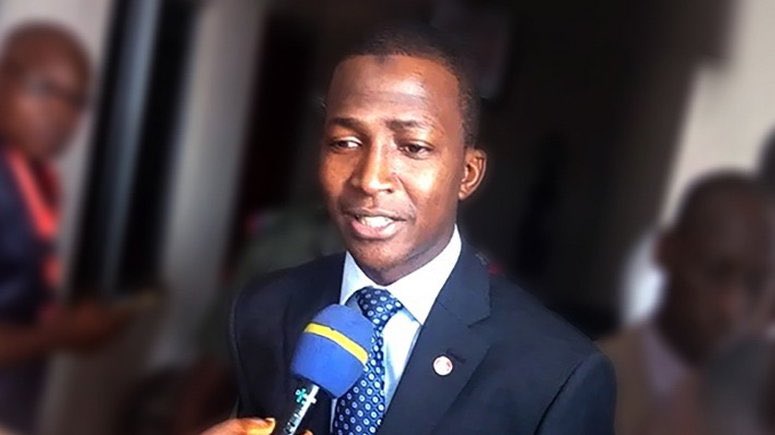Abdulrasheed Bawa, the chairman of the Economic and Financial Crimes Commission, EFCC, has said the dollar might drop to ₦200 after the redesigning of naira.
Bawa stated this in an interview with Deutsche Welle, DW, Hausa service, saying President Muhammadu Buhari did well to approve the redesigning.
He said, “The law says the redesigning of Naira notes should be done every eight years but we spent 20 years without any changes on them. And that resulted to 85 percent of money are in circulation not in banks, when CBN came up with this redesigning, dollar moved to 880 and later dropped to 680 or thereabouts.
“So you see with this redesigning dollar may massively fall, who knows probably to ₦200.”
The EFCC chair also said there is no any political motive behind the idea and called on Nigerians to report any person with siphoned monies.
“There is no political motive in this; some people siphoned and hid public funds that is why we want them to bring them out and nobody says they should not bring them, what government says is let them deposit such money in banks.
“We assure Nigerians that we are always ready to receive reports of any person with suspicious hidden money and if investigated to be true, we will give 5 percent of the money to them,” he added.
Nigeria’s Central Bank Governor Emefiele Gives Reasons For Redesigning Naira Notes
Godwin Emefiele, the governor, Central Bank of Nigeria, CBN, has explained the reasons for the sudden policy of redesigning the nation’s currency notes – the N200, N500, and N1,000 with immediate effect.
The apex bank boss who announced this at a press briefing on Wednesday, October 26, 2022, said the measure became necessary to safeguard the integrity of the monetary policy authority and the nation which was being compromised.
Emefiele said the integrity of a local legal tender, the efficiency of its supply, as well as its efficacy in the conduct of monetary policy are some of the hallmarks of a great Central Bank.
He however noted that currency management had faced several daunting challenges that have continued to grow in scale and sophistication with attendant and unintended consequences for the integrity of both the CBN and the country.
He said currency hoarding, counterfeiting, and mishandling are the key reasons for the decision to withdraw the banknotes.
He listed as primary challenges:
“Significant hoarding of banknotes by members of the public, with statistics showing that over 80 percent of currency in circulation are outside the vaults of commercial banks;
“Worsening shortage of clean and fit banknotes with an attendant negative perception of the CBN and increased risk to financial stability;
“Increasing ease and risk of counterfeiting evidenced by several security reports.”
He said, “On the basis of these trends, problems, and facts, and in line with Sections 19, Subsections (a) and (b) of the CBN Act 2007, the Management of the CBN sought and obtained the approval of President Muhammadu Buhari to redesign, produce, and circulate new series of banknotes at N100, N200, N500, and N1,000 levels.”
According to Emefiele, while global best practice is for central banks to redesign, produce and circulate new local legal tender every 5–8 years, the Naira has not been redesigned in the last 20 years.
He said that in line with the presidential approval, the apex bank had finalised arrangements for the new currency to begin circulation from December 15, 2022.
He stressed that the new and existing currencies shall remain legal tender and circulate together until January 31, 2023, when the existing currencies shall cease to be legal tender.
He said that all Deposit Money Banks currently holding the existing denominations of the currency may begin returning these notes back to the CBN effective immediately, adding that the newly designed currency will be released to the banks in a order of First-come-First-serve basis.
“Customers of banks are enjoined to begin paying into their bank accounts the existing currency to enable them withdraw the new banknotes once circulation begins in mid-December 2022.
“All banks are therefore expected to keep their currency processing centers from Monday to Saturday so as to accommodate all cash that will be returned by their customers.
“For the purpose of this transition from existing to new notes, bank charges for cash deposits are hereby suspended with immediate effect. Therefore, DMBs are to note that no bank customer shall bear any charges for cash returned/paid into their accounts.
“Members of the public are to please note that the present notes remain legal tender and should not be rejected as a means of exchange for purchase of goods and services.
“We would like to use this opportunity to reassure the general public that the CBN would continue to monitor both the financial system in particular, and the economy in general, and always act in good faith for the achievement of the Bank’s objectives and the betterment of the country,” he said.







